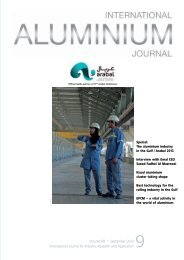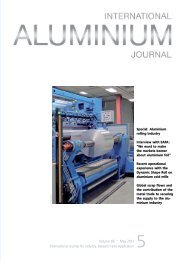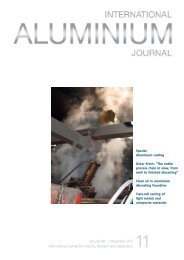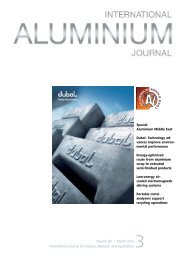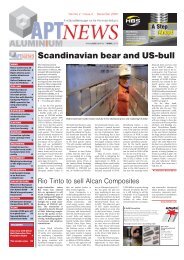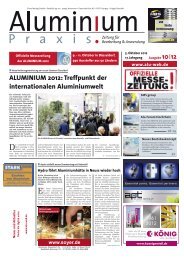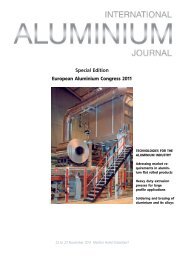special - Alu-web.de
special - Alu-web.de
special - Alu-web.de
Create successful ePaper yourself
Turn your PDF publications into a flip-book with our unique Google optimized e-Paper software.
COMPANY NEWS WORLDWIDE<br />
© Tenova LOI Thermprocess<br />
ment line for aluminium strip coils for the<br />
Ma’a<strong>de</strong>n-Alcoa facility in Saudi-Arabia. The<br />
line consists of single-coil lifting hearth furnaces<br />
which allow the individual heat treatment<br />
of coils. The installation is scheduled for<br />
2013.<br />
This heat treatment line allows adapted<br />
heat treatment according to the specific needs<br />
of the individual strip within short time, instead<br />
of heat treatment in a batch of several<br />
coils, which would require an average heat<br />
treatment or the combination of a batch of<br />
i<strong>de</strong>ntical strip coils. The heat treatment and<br />
cooling can be processed in protective atmosphere.<br />
The system works fully automatically<br />
from taking the coil out of the storage area<br />
until the heat treated coil is placed into the<br />
storage area again.<br />
The <strong>special</strong> plant and furnace <strong>de</strong>sign has<br />
been invented in 1998 by LOI Thermprocess<br />
and has been installed first at Alcan Singen,<br />
Germany. To date LOI has installed more than<br />
fifty units.<br />
Seco/Warwick Allied supplies<br />
soaking pit furnaces to Hindalco<br />
Seco/Warwick Allied has recently installed<br />
seven soaking pit furnaces at Hindalco Industries<br />
in Hirakud in eastern India. The furnaces<br />
feature si<strong>de</strong>-mounted fans, which improve<br />
maintenance access, and a combination of fan<br />
and heater arrangements to produce separate<br />
control zones along the vertical length of the<br />
slabs as well as a patented adjustable baffle<br />
<strong>de</strong>sign. The furnaces are <strong>de</strong>signed for vertical<br />
loa<strong>de</strong>d slabs to process can body stock.<br />
Each furnace is <strong>de</strong>signed for a maximum load<br />
of 128 tonnes. The overall charge height is<br />
five metres maximum and 3.5 metres minimum<br />
from eight to 16 slabs per batch. An<br />
adjustable baffle has been provi<strong>de</strong>d for<br />
proper air circulation in the event shorter slab<br />
heights are loa<strong>de</strong>d. The furnace is <strong>de</strong>signed<br />
for electrical heating with individual self-propelled<br />
lid (cover) trolley mechanism, and is<br />
equipped with PLC-based control and monitoring<br />
system.<br />
New Otto Junker induction heater<br />
for Hydro <strong>Alu</strong>minium Nenzing<br />
Otto Junker has received an or<strong>de</strong>r from Hydro<br />
<strong>Alu</strong>minium Nenzing for another induction-type<br />
heater including log storage and log<br />
handling equipment. More than 30 years ago,<br />
Otto Junker supplied one of the world’s first<br />
induction-type aluminium log heaters with a<br />
downstream hot shear to Hydro’s Nenzing<br />
works. In 2007, this system was upgra<strong>de</strong>d to<br />
3,600 kW by adding an Otto Junker-supplied<br />
IGBT converter system; as a result, it now attains<br />
a throughput of nearly 80 billets per hour.<br />
The consistently positive experience gathered<br />
with this plant prompted Hydro <strong>Alu</strong>minium<br />
Nenzing to opt for an Otto Junker furnace<br />
system of nearly i<strong>de</strong>ntical <strong>de</strong>sign when a new<br />
investment <strong>de</strong>cision came up.<br />
The system comprises a feed table with<br />
chain conveyor, a vertical log magazine for<br />
up to 60 logs, a feed conveyor, and an induction<br />
furnace measuring around five metres<br />
in length in which the logs are heated to a <strong>de</strong>sired<br />
temperature profile before being cut to<br />
length in the existing hot shear prior to entering<br />
the press.<br />
Logs are <strong>de</strong>livered to the chain-type log<br />
magazine by forklift truck and are stored and<br />
managed according to alloy type. On the feed<br />
conveyor, the length of each log is accurately<br />
measured for the required ‘odd end’ optimisation<br />
process. Heating is carried out in a multilayer<br />
low-loss induction coil which, like in<br />
the existing heater, consists of six individually<br />
controlled coil sections.<br />
The billet heating operation relies on an<br />
IGBT converter system <strong>de</strong>veloped by Otto<br />
Junker. This converter system is based on<br />
transistor technology and offers the advantage<br />
of steplessly adjustable power control in addition<br />
to high efficiency and low maintenance<br />
needs. Designed by Otto Junker around ten<br />
years ago, the technology has since proven its<br />
merits in over 170 billet heating and induction<br />
melting furnace applications.<br />
Mechatherm mo<strong>de</strong>rnises<br />
Dubal’s casting pit DC1<br />
Mechatherm had been awar<strong>de</strong>d an or<strong>de</strong>r to<br />
completely rebuild Dubal’s casting pit DC1.<br />
The contract involved significant mechanical,<br />
hydraulic, electrical and combustion work to<br />
three furnaces and to a vertical aluminium billet<br />
casting machine. It required consi<strong>de</strong>rable<br />
<strong>de</strong>molition followed by civil work organised<br />
by Dubal. Only then could the new equipment<br />
be installed and commissioned with a complete<br />
new Mechatherm software automation<br />
system. Work was projected to take twelve<br />
weeks, during which the casting pit would be<br />
shut down completely, with no production.<br />
Due to the excellent collaboration with Dubal<br />
engineers, Mechatherm and its sub-contractors<br />
managed to complete the work and get<br />
the pit into production in less than eight weeks.<br />
Thus Dubal could cast over 5,000 tonnes of<br />
extrusion billet above their predicted output.<br />
Rusal begins installing hot bath<br />
crushing equipment from Outotec<br />
Rusal has begun the installation of hot bath<br />
crushing equipment at its Boguchany aluminium<br />
smelter in the Krasnoyarsk region of<br />
Russia. This fully automated equipment, supplied<br />
by German company Outotec, processes<br />
crushed hot bath to the required fraction of<br />
any size. It will cost €5.1m (USD6.7m).<br />
The line is one of the most advanced on the<br />
market and will be used for the first time in<br />
Russia. It has a capacity of 40 tph, which will<br />
ALUMINIUM · 7-8/2013 71



